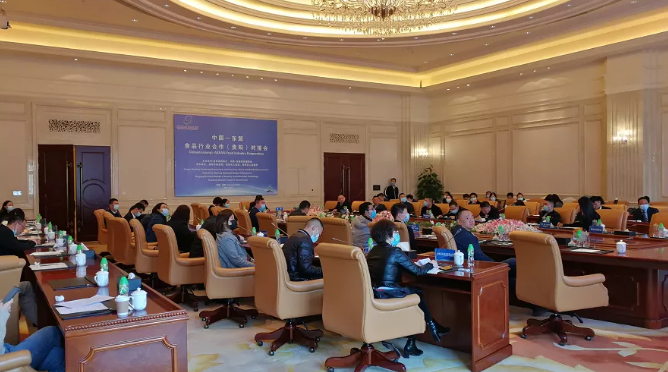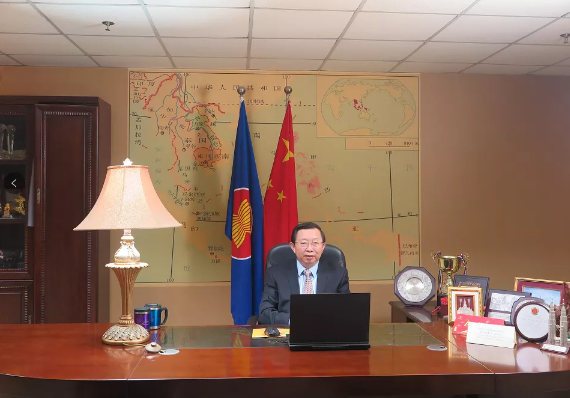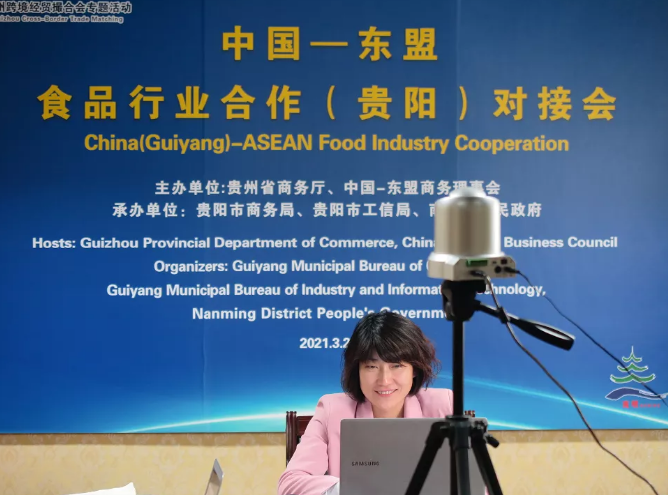China-ASEAN Food Industry Cooperation Matchmaking was held

China-ASEAN Food Industry Cooperation Matchmaking was held on March 24, 2021, taking the form of both online and offline. Mr. Xu Ningning, Executive President of China-ASEAN Business Council, pointed out that the Regional Comprehensive Economic Partnership (RCEP) has presented many new business opportunities for the cooperation and development of the food industry. The cooperation in the food industry between China and ASEAN is highly complementary, and the two sides should focus on strengthening the industry cooperation to develop the complementary aspects and new business opportunities.
Mr. Xu Ningning said that China and ASEAN have many advantages in cooperation. Two sides have advantages of regional cooperation, which is convenient for food trade and transportation; have the policy advantage of opening their markets to each other, which is important for investment cooperation; have a solid foundation for the long-term development of economic and trade cooperation, which is conducive to further deepening mutually beneficial cooperation; have a positive desire to enhance cooperation, which is essential to sustainable cooperation.

Mr. Xu Ningning pointed out that the neighboring ASEAN countries attach great importance to the development of the food industry and have become the first chosen destinations for Chinese food enterprises to "go out". At the same time, China is implementing the "double cycle" economic development which establish a favorable condition for food industries in ASEAN countries to enter China.
Mr. Lv Kejian, Former Director General of the Department of Asian Affairs of the Ministry of Commerce of China, said that this meeting promoted the development of RCEP industrial cooperation, showing the new business opportunities of cooperation between China and ASEAN food industry, having a positive and practical significance. As the largest and important trading partner of each other, both sides should develop the food industry at present and in the future. Especially the signing of the RCEP provided a broader space for bilateral cooperation, suggesting that both sides should fully utilize the China-ASEAN cooperation committee of food industry have cooperation mechanism, positive collaborate with each sides, and open up a new development of trade and investment cooperation.
ASEAN-China Food Industry Cooperation Committee is a food industry cooperation mechanism led by China-ASEAN Business Council and jointly composed by food industry associations and representative entrepreneurs from China and ASEAN countries, to promote complementary advantages and common development of the food industry and enterprises of both sides.
At the meeting, Mr. See Chee Kong, Minister (Economy) of Embassy of Malaysia, said that food processing industry is one of the main economic pillars of Malaysia, accounting for 10% of its manufacturing output value. Malaysia encourages investment in the food processing industry, including projects in products such as palm oil-based food ingredients, animal fat substitutes, cocoa butter substitutes, food additives, flavoring agents, food supplements, plant extracts, aquatic feeds, etc. In 2020, the trade between Malaysia and China's Guizhou expanded 2.5 times compared with the previous year. As the RCEP Agreement is about to enter into force, Malaysia looks forward to strengthening cooperation with China and exploring constructive cooperation in multiple industries, including the food industry.
Ms. Wanthana Tatan, Minister Counsellor of Royal Thai Embassy, said that Thailand has about 9,000 food processing companies and is a major producer and exporter of processed foods such as canned tuna, frozen seafood, shrimp and chicken, said. The Thai government has identified the food industry as one of the engines of "Thailand 4.0" economic growth, and the policy of vigorously developing the food industry has brought good opportunities. Thailand is willing to deepen cooperation with Chinese food enterprises.
Ms. Ma Jianlei, Deputy Director, Regional Trade Division, Agricultural Trade Promotion Center, Ministry of Agriculture and Rural Affairs of China, said that as the RCEP is about to take effect, the matchmaking meeting build a bridge for bilateral cooperation in the agricultural and food industries. Taking advantges of the preferential policies of RCEP is not only of great significance to enhancing China-ASEAN cooperation in the food industry, but also of positive significance to open up high-level agriculture. Under the China-ASEAN Free Trade Area, ASEAN countries still retain tariffs on processed prawns, processed potatoes, fish sauce and other products, while China retains tariffs on unground pepper, pineapple juice, coconut juice and other products, which will soon be phased out under RCEP.
Ms. Ma Jianlei has the following suggestions. First, actively expand food trade. Learn about the arrangement of tariff concessions and rules of origin of agricultural products of RCEP members in advance, and conduct in-depth research on the consumption scale, market capacity and demand characteristics of target markets. Improve the level of technology and equipment to produce marketable products. Through participating in online and offline industry exhibitions, companies can get to know customers extensively and expand export channels. Second, carry out cooperation in food processing technology and equipment. The food industry in ASEAN countries is gradually shifting to deep processing, and the demand for improving food processing technology and optimizing packaging quality is constantly expanding. China's food processing technology and equipment have unique advantages of fast delivery, reliable quality and high cost performance. Food enterprises can take advantage of the increased access to the ASEAN agricultural services investment market under the RCEP to carry out cooperation in the field of food technology and equipment. Third, plan the layout of regional food industry chain and value chain. RCEP members are highly complementary in the agricultural industry chain. Australia and New Zealand are important exporters of beef, mutton, dairy and other agricultural products and are in the position of raw material suppliers of agricultural products. Japan and South Korea are big markets for agricultural products consumption; China and ASEAN have large populations, large agricultural production and prosperous trade of agricultural products. Food enterprises can optimize resource allocation within the RCEP region, make full use of ASEAN's cheap labor force, rich agricultural resources, and China's mature food processing technology, carry out cross-border food industry chain cooperation, jointly develop the unified RCEP market, and cultivate new advantages for participating in international competition and cooperation.
At the matchmaking, Ms. Ran Li, Deputy Director of Guizhou Department of Commerce, Mr. Adhi Luckman, President of Indonesia Food and Beverage Association, Mr. David Lau, Vice President of Thai Food Processors Association, Mr. Ng Yan Huay, Honorary President of Singapore Food Manufacturers' Association, Mr. Ch’ng Oon Teong, Vice President of Food Industry Association of Federation of Malaysian Manufacturers, Mo Shun Kan, Vice Chairman of the China Hong Kong And Macau Expatriate and Business Association of Cambodia, Mr. Wang Hua, Standing Vice President of China Guizhou Specialty Food Industry Promotion Association, Mr. Tian Qiming, Chairman of China's guizhou province jade dream food (group) co., LTD. and sour soup in guizhou industry association, Mr. Ma Liping, China's guizhou province agricultural science and technology development co., LTD., delivered speeches successively.
Mr. Adhi Lukman, President of the Indonesian Food and Beverage Association, said that it is necessary to establish a dialogue mechanism and industrial cooperation committee among relevant trade associations of RCEP member states, including the food industry, to promote cooperation in trade and investment.
Mr. David Lau, Vice President of Thai Food Processors Association, said that the cooperation between China and ASEAN in the food industry is highly complementary, and it is necessary to strengthen cooperation in the development of e-commerce platform, improve the level of automatic production line processing and new product development, so as to promote the sustainable development of the food industry of both sides.
Mr. Ng Yan Huay, Honorary President of Singapore Food Manufacturers' Association, said that despite the difficulties and impact brought by the pandemic, it has contributed to the growth of food demand, so opening up the market and strengthening international exchanges will help the food industry to develop cooperation. Singapore sincerely looks forward to strengthening cooperation with relevant Chinese food enterprises in order to jointly explore endless business opportunities.
At the meeting, China Guizhou Specialty Food Industry Promotion Association and Thailand Food Processors’ Association signed the MOU.

The meeting was co-hosted by the China-ASEAN Business Council(CABC) and the Department of Commerce of Guizhou Province. Mrs. Liuxin, Executive Secretary General of CABC, mentioned that the meeting was supported by embassies and industry associations of ASEAN countries in China, analyzing the cooperation opportunities, expressing a desire to improve cooperation actively, putting forward the proposals for cooperation, and indicating the food industry cooperation between China and ASEAN countries under RCEP open markets will gain greater development.
In the first two months of 2021, ASEAN continued to be China's largest trading partner, with the total trade value reaching 786.2 billion RMB, increase by 32.9% year on year and accounting for 14.4% of China's total foreign trade. Among them, exports to ASEAN reached 439.83 billion RMB, increasing 43.2%; Imports from ASEAN reached 346.37 billion RMB, increasing by 21.8%; The trade surplus with ASEAN was 93.46 billion RMB, increasing by 310.4%.
【图文来源于网络,如有侵权,请联系我们删除】


